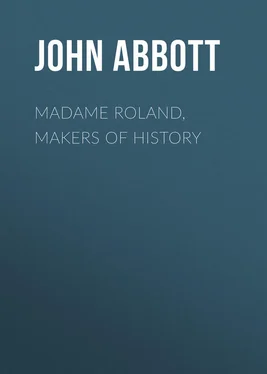John Abbott - Madame Roland, Makers of History
Здесь есть возможность читать онлайн «John Abbott - Madame Roland, Makers of History» — ознакомительный отрывок электронной книги совершенно бесплатно, а после прочтения отрывка купить полную версию. В некоторых случаях можно слушать аудио, скачать через торрент в формате fb2 и присутствует краткое содержание. ISBN: , Жанр: foreign_antique, foreign_prose, Историческая проза, на английском языке. Описание произведения, (предисловие) а так же отзывы посетителей доступны на портале библиотеки ЛибКат.
- Название:Madame Roland, Makers of History
- Автор:
- Жанр:
- Год:неизвестен
- ISBN:http://www.gutenberg.org/ebooks/28445
- Рейтинг книги:4 / 5. Голосов: 1
-
Избранное:Добавить в избранное
- Отзывы:
-
Ваша оценка:
- 80
- 1
- 2
- 3
- 4
- 5
Madame Roland, Makers of History: краткое содержание, описание и аннотация
Предлагаем к чтению аннотацию, описание, краткое содержание или предисловие (зависит от того, что написал сам автор книги «Madame Roland, Makers of History»). Если вы не нашли необходимую информацию о книге — напишите в комментариях, мы постараемся отыскать её.
Madame Roland, Makers of History — читать онлайн ознакомительный отрывок
Ниже представлен текст книги, разбитый по страницам. Система сохранения места последней прочитанной страницы, позволяет с удобством читать онлайн бесплатно книгу «Madame Roland, Makers of History», без необходимости каждый раз заново искать на чём Вы остановились. Поставьте закладку, и сможете в любой момент перейти на страницу, на которой закончили чтение.
Интервал:
Закладка:
Jane appears never to have known the frivolity and thoughtlessness of childhood. Before she had entered the fourth year of her age she knew how to read. From that time her thirst for reading was so great, that her parents found no little difficulty in furnishing her with a sufficient supply. She not only read with eagerness every book which met her eye, but pursued this uninterrupted miscellaneous reading to singular advantage, treasuring up all important facts in her retentive memory. So entirely absorbed was she in her books, that the only successful mode of withdrawing her from them was by offering her flowers, of which she was passionately fond. Books and flowers continued, through all the vicissitudes of her life, even till the hour of her death, to afford her the most exquisite pleasure. She had no playmates, and thought no more of play than did her father and mother, who were her only and her constant companions. From infancy she was accustomed to the thoughts and the emotions of mature minds. In personal appearance she was, in earliest childhood and through life, peculiarly interesting rather than beautiful. As mature years perfected her features and her form, there was in the contour of her graceful figure, and her intellectual countenance, that air of thoughtfulness, of pensiveness, of glowing tenderness and delicacy, which gave her a power of fascination over all hearts. She sought not this power; she thought not of it; but an almost resistless attraction and persuasion accompanied all her words and actions.
It was, perhaps, the absence of playmates, and the habitual converse with mature minds, which, at so early an age, inspired Jane with that insatiate thirst for knowledge which she ever manifested. Books were her only resource in every unoccupied hour. From her walks with her father, and her domestic employments with her mother, she turned to her little library and to her chamber window, and lost herself in the limitless realms of thought. It is often imagined that character is the result of accident – that there is a native and inherent tendency, which triumphs over circumstances, and works out its own results. Without denying that there may be different intellectual gifts with which the soul may be endowed as it comes from the hand of the Creator, it surely is not difficult to perceive that the peculiar training through which the childhood of Jane was conducted was calculated to form the peculiar character which she developed.
In a bright summer's afternoon she might be seen sauntering along the Boulevards, led by her father's hand, gazing upon that scene of gayety with which the eye is never wearied. A gilded coach, drawn by the most beautiful horses in the richest trappings, sweeps along the streets – a gorgeous vision. Servants in showy livery, and out-riders proudly mounted, invest the spectacle with a degree of grandeur, beneath which the imagination of a child sinks exhausted. Phlippon takes his little daughter in his arms to show her the sight, and, as she gazes in infantile wonder and delight, the discontented father says, "Look at that lord, and lady, and child, lolling so voluptuously in their coach. They have no right there. Why must I and my child walk on this hot pavement, while they repose on velvet cushions and revel in all luxury? Oppressive laws compel me to pay a portion of my hard earnings to support them in their pride and indolence. But a time will come when the people will awake to the consciousness of their wrongs, and their tyrants will tremble before them." He continues his walk in moody silence, brooding over his sense of injustice. They return to their home. Jane wishes that her father kept a carriage, and liveried servants and out-riders. She thinks of politics, and of the tyranny of kings and nobles, and of the unjust inequalities of man. She retires to the solitude of her loved chamber window, and reads of Aristides the Just, of Themistocles with his Spartan virtues, of Brutus, and of the mother of the Gracchi. Greece and Rome rise before her in all their ancient renown. She despises the frivolity of Paris, the effeminacy of the moderns, and her youthful bosom throbs with the desire of being noble in spirit and of achieving great exploits. Thus, when other children of her age were playing with their dolls, she was dreaming of the prostration of nobles and of the overthrow of thrones – of liberty, and fraternity, and equality among mankind. Strange dreams for a child, but still more strange in their fulfillment.
The infidelity of her father and the piety of her mother contended, like counter currents of the ocean, in her bosom. Her active intellect and love of freedom sympathized with the speculations of the so-called philosopher. Her amiable and affectionate disposition and her pensive meditations led her to seek repose in the sublime conceptions and in the soul-soothing consolations of the Christian. Her parents were deeply interested in her education, and were desirous of giving her every advantage for securing the highest attainments. The education of young ladies, at that time, in France, was conducted almost exclusively by nuns in convents. The idea of the silence and solitude of the cloister inspired the highly-imaginative girl with a blaze of enthusiasm. Fondly as she loved her home, she was impatient for the hour to arrive when, with heroic self-sacrifice, she could withdraw from the world and its pleasures, and devote her whole soul to devotion, to meditation, and to study. Her mother's spirit of religion was exerting a powerful influence over her, and one evening she fell at her feet, and, bursting into tears, besought that she might be sent to a convent to prepare to receive her first Christian communion in a suitable frame of mind.
Читать дальшеИнтервал:
Закладка:
Похожие книги на «Madame Roland, Makers of History»
Представляем Вашему вниманию похожие книги на «Madame Roland, Makers of History» списком для выбора. Мы отобрали схожую по названию и смыслу литературу в надежде предоставить читателям больше вариантов отыскать новые, интересные, ещё непрочитанные произведения.
Обсуждение, отзывы о книге «Madame Roland, Makers of History» и просто собственные мнения читателей. Оставьте ваши комментарии, напишите, что Вы думаете о произведении, его смысле или главных героях. Укажите что конкретно понравилось, а что нет, и почему Вы так считаете.












